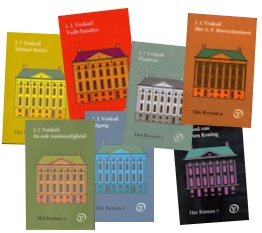Het Bureau is a series of seven books that describes several decades of the life of Maarten Koning. It is an autobiographic book based on the career of the author J.J. Voskuil at the national research institute for Dutch language and culture.
I read the first book during my trip to Menlo Park and finished the final book a month later. I greatly enjoyed these books and it become one of my all-time favorite works. Het Bureau is a little like a "soap for intellectuals", describing the life and the career of an academic working on Dutch folk culture and mythology, and the bureaucratic entrails of a stuffy research institute that nobody takes very seriously.
The story is slow, but very carefully crafted. The people in the book involve into very rich characters. I enjoyed the descriptions of Amsterdam and the Dutch country side. Meneer Beerta has become one of my ever favorite characters in Dutch literature. The book is almost boring at times, but very addictive, and sometimes very funny -- the part about the “dorsflegel” was hilarious.
I especially enjoy reading about the board meetings (“de Commissie”). They are short but full of political intrigue. When I read about the interaction between Maarten and his subordinates, it makes my blood curl. They flat-out refuse the work assigned to them, undermine his work and pretend to be out sick all the time.
The book has a nostalgic mood occasionally. It is interesting to read how things were done in an office in the 1960’s. All letters, for example, were typed on a type-writer with overlays for the archive. It is interesting to see how cars get more and more common, and throughout the years more and more employees at Het Bureau get a car. The main character despises cars and doesn’t hesitate to make his opinion known.
The main character is not exactly an optimistic person. "Hij besefte plotseling hoe weinig er van het verleden was overgebleven en hoe uitzichtloos de toekomst was tegen de achtergtrond van de zich opstapelende, zinloze verantwoordelijkheden.” (“He realized how little of his past remained, and how pointless the future was against a background of steadily increasing but futile responsibilities”).

Maarten Koning is cynical about his profession and his fellow researchers.
“Maar ik maak geen indruk! Daarvoor praat ik veel te snel en veel te ingewikkeld. Als je indruk wilt maken, moet je wachten tot iedereen moe is, en dan moet je heel langzaam iets ontzettend banaals zeggen. Dat begrijpen ze en dat wordt het!”
“But I don’t make a strong impression! I speak too quickly and too complicated. If you want to make a good impression you should wait until everybody is tired, and then very slowly say something very mundane. That will be understood, and then implemented!”
Snobism
'Er komen daar natuurlijk allemaal natuurkundigen, chemici, biologen, geologen. Wat moeten die met de Nederlandse volkstaal en volkcultuur?' 'Dat interesseert ze juist!' zei Balk apodictisch. 'Eindelijk eens echte wetenschap!' - hij lachte met een grimmig sarcasme. Voor wat wij doen, heeft iedere intellectueel belangstelling. Dat geeft die bètamensen juist status! En anders prikkelt het het snobisme!' - hij glimlachte gemeen.
Balk is right about that, I greatly enjoyed reading about the scientific work that is being done in Het Bureau and how the ideas about the field change through the years. I subscribed to Quotidian, a new magazine about the study of everyday life.
When I was in high school I had heard about new parts of the book being published -- the publisher managed to stir up quite a hype around these books -- and it was a lot of fun to read old newspaper articles and interviews with characters from the book afterwards.
On a final note -- this is the quintessential Dutch book. If you want to understand more about Dutch culture and history, and your Dutch is fluent and you don't mind reading 5,500 pages... this is the book for you.
